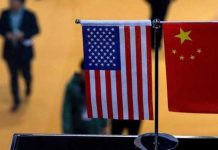Tashkent, Uzbekistan (DNA) — On 20 December 2019, in the building of the Republican Higher School of Business and Management under the National Agency for Project Management under the President of the Republic of Uzbekistan, a final conference was held with the participation of ministries and departments that took part in training seminars organized by the Office of the Trade Advisor -economic issues of the Embassy of China.
The event was jointly organized by the National Agency for Project Management under the President of the Republic of Uzbekistan, the Embassy of the People’s Republic of China in the Republic of Uzbekistan and the Office of the Advisor on Trade and Economic Affairs of the Chinese Embassy.
The seminar was opened with a welcoming speech by the Deputy Director of the Agency, Vyacheslav Pak, who emphasized the importance of the event, which had already become traditional, and thanked the Government of the PRC in the person of the Embassy and the Office for Trade and Economic Affairs for its contribution to the development of human capital and the training of national personnel.
Zhang Wenchuan, Charge d’Affaires of the Embassy of the People’s Republic of China in the Republic of Uzbekistan, noted that strengthening cooperation and the exchange of experience in all areas is important for Uzbekistan and China and indicated that it is planned to further strengthen the positive impact of the ongoing initiatives in many areas.
Welcoming the participants and guests of the ceremony, the director of the Higher School Abduraupov Rustam said that over the years of cooperation between the PRC and Uzbekistan significant results have been achieved in the fields of tourism, healthcare, agriculture, industry, science and education.
Ms. Jin Yulong, Advisor on Trade and Economic Affairs of the Embassy of the People’s Republic of China in the Republic of Uzbekistan, noted the dynamically developing cooperation between China and Uzbekistan, the growth of mutual trade turnover, the importance of the ongoing work in organizing trainings, seminars and training courses that strengthen friendship between the countries.
In turn, representatives of various organizations and departments that participated in the above seminars and training courses made their reports.
Marguba Rejapova, researcher at the Institute of Genetics and Experimental Plant Biology: “A cooperation agreement was signed with the Xinjiang Institute of Ecology and Geography of CAS. In the course of cooperation between the institutes, experiments were conducted on the use of drip irrigation in Zangiata and Durmen experimental stations of the institute. “The results showed an increase in yield and a decrease in water consumption due to drip irrigation by 70%.”
Nishonov Shodi, Head of the Department of International Relations and Attraction of Investments, Scientific-Production Center for Agriculture and Food Supply under the Ministry of Agriculture of the Republic of Uzbekistan, said: “Thanks to the Government of the People’s Republic of China, the Chinese Embassy in the Republic of Uzbekistan, the National Agency for Project Management under the President of the Republic of Uzbekistan and the Republican Abu Raikhan Beruniy Higher School of Business and Management, this year more than 40 researchers took courses advanced training in agriculture, hybrid rice, oilseeds, plant protection, fruit and vegetable processing, etc. Note that a joint “Sino-Uzbek” rice center is being created. ”
Over the entire period of cooperation (2018-2019) of the Agency with the Office of the Advisor on Trade and Economic Affairs of the Embassy of the PRC, represented by the Ministry of Commerce of the PRC, more than 300 seminars and trainings on various topics for public sector employees of the Republic of Uzbekistan have been successfully organized. More than 1800 participants from ministries and departments took part in them.
Seminars and trainings were held on various topics, such as: agriculture and water management, finance and economics, information technology and e-commerce, ecology and tourism, business development and attracting investments, infrastructure development and trade facilitation, education and entrepreneurship, etc.
















